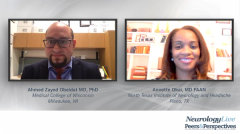
Newer Oral DMTs in Clinical Practice
Annette Okai, MD, FAAN, discusses how she is utilizing the newer oral therapies and treatment advances in her practice.
Episodes in this series

Ahmed Zayed Obeidat, MD, PhD: I want to first switch topics a little bit, staying with the oral therapies, but I want to go more into asking you directly about your practice and how have you adopted the recent advances in these new oral therapies to improve patient care in your own practice.
Annette Okai, MD, FAAN: This is an exciting time to be in multiple sclerosis, and the advances that have been made have just been tremendous, not only for patients but also for us as providers. In my practice, I do a lot of clinical studies, so my familiarity with newer drugs before they come to the market makes it easier for me to discuss with patients by the time they reach to me, so what the drug is like, what to expect, how we monitor, and all of that. So, I will say an early adapter is important, and I think providing the patients the options early on is also something that's important, because we have medications that really change the trajectory of the disease. I like to see what we are doing in the field; I like what is out there and what is coming for us and our patients, taking into account that this is a game changer for most of them. With looking at just the mechanisms of action of the various therapies that we have, we have been able to offer someone a medication that they can take, and I can tell them based on the data that … the risk of relapse in the first 5 years may be 1 or even less versus someone who's having a relapse at 2 or 3 times a year. Or I can offer them a therapy where they have a total of 20 days in 2 years, and I can say the chances of you being stable for the next 2 years after that for the total of 4 years is very high over time. The different mechanisms that we have is just exciting, and not only that, but the effect that it has on the disease, improving the quality of life, that they don't have to deal with relapses, that MS [multiple sclerosis] is not interrupting their life, that they can go about their career, the family life, the social life, without having this intruder there every time, is very significant. With what we have right now, we've made great strides in the past 25 to 30 years that we have reduced disability rates and prolonged life span, and what we have coming is very exciting for me and what I have to offer to my patients.
Ahmed Zayed Obeidat, MD, PhD: That's great to know, and as you mentioned, every time now we are aiming for more disease control. Now we even aim for neither, not having disease activity and we strive to reach that, and we are trying to achieve the best personalized approach for each patient.
Transcript Edited for Clarity
Newsletter
Keep your finger on the pulse of neurology—subscribe to NeurologyLive for expert interviews, new data, and breakthrough treatment updates.












